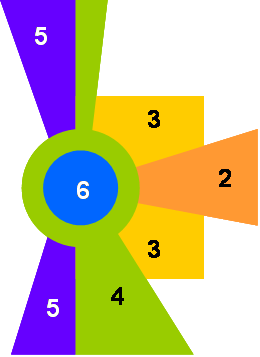How Green is the Internet?
Guest Post by Zeke Iddon
Yes, the entire Internet.
A fairly odd question, but one that will probably give you pause for thought; in a world where the phrase ‘global warming’ is synonymous with SUVs, air conditioning and poor recycling, it isn’t often that we consider one of the most widely-used resources ever to grace the planet.
So, how green is the Internet? The answer will probably surprise you…
The Case Against
Putting aside for one moment the amount of energy used to power offices and home computer set-ups around the world, the data centers which they access are worth examining.
Forming the core of the ‘net, these data centers are absolutely gigantic – many are the size of large shopping malls – and house rows and rows of power-hungry cabinets as well as the systems which keep them cool.

It’s difficult to quantify exactly how much CO2 is produced globally since it can vary wildly depending on what power grid they derive their energy from (for instance, if a country runs its electricity grid via fossil fuels), but our best estimates put the worldwide CO2 emissions from data centers at around 80 megatons.
It’s a hard number to visualize, but to put it into perspective these data centers account for 1.5% of all the world’s electricity (as of 2010). By 2020, it is predicted that the emissions put out by all of the data centers on the planet will quadruple, making this sector of industry a bigger pollutant than the airline industry.
But if you think that sounds extreme, consider this: data centers are only 10% of the equation.
90% of the pollution is generated within our own homes.

Connecting to a network wirelessly (either through routers or via mobile carriers) accounts for nearly 43.2 TerraWatts of all energy usage, which carries a carbon footprint equal to putting nearly 5 million new cars on the road.
With this in mind, it’s not surprising that having this technology in our homes has implications not just for the planet, but also our own health. There’s strong evidence to suggest that radiation emissions from WiFi routers and static towers has a tangible effect on the human body, which gives further rise to concern about our reliance on WiFi. These dangers – as well as the carbon footprint – are greatly mitigated by simply plugging into a router directly.
Obviously we’re not suggesting that the world shuts down the entire Internet, but at face value, the Internet appears to be one of the biggest – and most often ignored – drains on our resources, and something that should be used sparingly… or is it?
The Case For
In order to fully understand this tricky puzzle, we need to look at the bigger picture. Every activity uses up resources; what it really comes down to is how sustainable those activities and resources are.
We cannot begin to count the amount of hours spent watching cat videos on YouTube, or how much energy is used up by teenage girls pursuing One Direction on Twitter. But what we can quantify is the energy savings afforded to businesses on a practical level:
Increased connectivity allows for better telecommuting. Home offices typically use half the energy of a corporate set-up, and hugely telecommuting reduces emissions caused by traffic congestion.

This applies to numerous industries, too – particularly ones that are moving towards digitization. If you cut out the amount of unnecessary travel, and also factor in that telecommuting is proven to increase productivity, the Internet is very much a force for environmental good.
And while the amount of data centers needed to house the ‘net is on the up, so are their efficiency levels. In part driven by Green Peace activism (and for cost reasons), many of the big data companies – Google, Apple, Facebook, etc. – are striving to make their data centers more energy efficient.
According to a Standford report, the big players have the potential to reduce CO2 emissions by a huge 88%, and Apple have already managed to become carbon-neutral.
In Conclusion
So the question isn’t necessarily how green the Internet is, but more one of how green we can make it.
The answer for those of us at home?
Plug directly into your wireless routers, and try to work from home more often.
The planet will thank you for it.


















